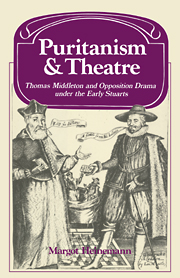Book contents
- Frontmatter
- Contents
- Introductory note
- 1 Time and Place
- 2 Puritanism, Censorship and Opposition to the Theatre
- 3 Middleton as Satirical Journalist
- 4 Early Satirical Comedies
- 5 How Anti-Puritan are Middleton's City Comedies?
- 6 Money and Morals in Middleton's City Comedies
- 7 Middle Years: Tragi-comedy and Moral Comedy
- 8 City Employments
- 9 Hard Times and Hengist, King of Kent
- 10 Political Satire: A Game at Chess
- 11 City Tragedy
- 12 Drama and Opposition, 1619–1640
- 13 From Popular Drama to Leveller Style: a Postscript
- Appendices
- Index
1 - Time and Place
Published online by Cambridge University Press: 03 November 2009
- Frontmatter
- Contents
- Introductory note
- 1 Time and Place
- 2 Puritanism, Censorship and Opposition to the Theatre
- 3 Middleton as Satirical Journalist
- 4 Early Satirical Comedies
- 5 How Anti-Puritan are Middleton's City Comedies?
- 6 Money and Morals in Middleton's City Comedies
- 7 Middle Years: Tragi-comedy and Moral Comedy
- 8 City Employments
- 9 Hard Times and Hengist, King of Kent
- 10 Political Satire: A Game at Chess
- 11 City Tragedy
- 12 Drama and Opposition, 1619–1640
- 13 From Popular Drama to Leveller Style: a Postscript
- Appendices
- Index
Summary
The energy of Middleton's plays is above all theatrical; the poetry works as part of the drama. If his tragedies are much more widely appreciated now than they were a generation ago, this is largely because a greater openness about sexual themes allows them to be freely staged in the theatre, viewed as Plays of the Month, or read aloud in the Sixth Form. Students are surprised to find them so accessible, even psychologically modern, though the harsh social standards and conflicts assumed are strikingly different from our own. And television audiences coming fresh to The Changeling have responded without difficulty to its totally human terror and despair.
Yet though it is pretty generally agreed that Middleton is at times, and in some plays, a great dramatist, we are still none too sure how to take him. Different minds seem indeed to read him very differently. His comedies have been variously seen as cynical, amoral, heartlessly making fun of the citizen milieu he came from, disgusting or boring; or (less frequently) as profoundly serious moral fables, in which even the bawdy is edifying. In Middleton's tragedies, T. S. Eliot thought he had no point of view, was merely a great recorder. Some later critics, however, have sensed a strong Calvinist bias, foredooming the protagonists from the beginning; others have felt that the ‘overtly religious’ moral and the grotesquely ingenious punishment visited on sinners strike a false and incongruous note in what is otherwise a realistically conceived human drama, and alienate all sympathy in the audience.
- Type
- Chapter
- Information
- Puritanism and Theatre , pp. 1 - 17Publisher: Cambridge University PressPrint publication year: 1980

